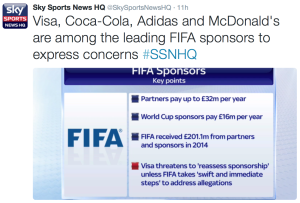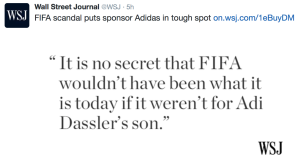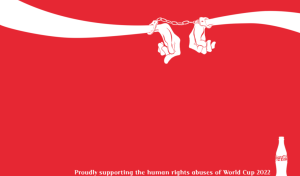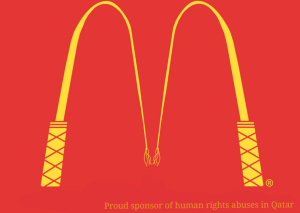The international football association FIFA is amidst another huge media crisis after Swiss police arrested some of FIFA’s top executives on Wednesday and charging them with money-laundering and other criminal acts linked to this ongoing corruption investigation. There is no doubt that this has smeared FIFA’s overall corporate brand and its acclaimed World Cup brand and as part of this media crisis FIFA’s sponsors have spoken publicly about the need for change and even in some cases (Visa) threatened to end the commercial partnership.
Photos: Examples of corporate sponsors in the spotlight because of FIFA’s actions (source: Sky Sports News, official Twitter account and WSJ, official Twitter)
So this scandal, which is one of many scandals being linked with FIFA and Sepp Blatter’s ‘mismanagement’, has rhetorically distanced the sponsors from FIFA and made them require a clean-up. Of course, corporate giants like Visa, Coca Cola, Budweiser and Adidas cannot live with the fact that their brands are associated with corruption charges for what reason they had to react. In football, these commercial partnerships are about moving customers and market shares through the passionate interest and identification tied to the world’s most popular sport. In this case, it is problematic that there is a negative match in terms of values between the rights holder (FIFA) and the sponsors. It rings hollow if these huge global corporate brands communicate that ‘we are doing so much good for the community and acting as a corporate citizen with solid CSR-values and policies’ while acting in ways opposed to that! In that sense, there is no harmony between what corporate brands (sponsors) would like to symbolize and how they act as of right now, which is problematic regarding their trustworthiness. This paints a picture that signals that these corporations strive to be connected to the transforming commercial power of football and not to FIFA.
However, the current situation portrays a problematic course of action in the postmodern sports landscape in which football fans (to a higher extent than decades ago) are political conscious and powerful consumers given the increased level of globalization and the new technologies characterizing today’s knowledge society. One consumer reaction is the protests on various social media platforms where consumers highlight that FIFA’s sponsors have an indirect responsibility if silently accepting that FIFA is abusing human rights concerning the 2022 Qatar World Cup and is leading an organization filled with corruption and mismanagement. Under these circumstances, there have been examples that point to virally spread online sites that ‘play’ with the logos of FIFA’s sponsors to send the a loud message; the purpose is to send the message that these companies on one hand want to be associated with positive ethical standards and fair play while on the other hand indirectly accept slave labor in Qatar. So, the strategic match between FIFA and its corporate sponsors is negative influenced and that diminishes the overall brand value for sponsors. Some football fans do not necessarily distinguish between the wrongdoings of FIFA and its corporate sponsors and that may cause some sponsors to find themselves in this ‘shitstorm’ via the debates on social media sites.
Photos: Examples of corporate sponsor logos being associated with the FIFA crisis (source: BoredPanda)
Nevertheless, these corporate sponsors are multinational corporations that are put in place to make profit. That is their first priority and they need to enhance the global distribution of their products. A commercial partnership with FIFA has helped to secure that, which explains why some of these sponsors have paid tons of money to FIFA over the span of many years despite the fact that FIFA’s linkage to corruption is not new.
FIFA and its commercial partners form a powerful cocktail
FIFA has proved to be very powerful in its role as the leading governing body of football and it has been hard to change Sepp Blatter’s position although his popularity is not great among football fans or the European counterpart UEFA and its underlying national football associations. Over the years, Blatter has done well to ‘charm’ many of the football stakeholders from ‘less developed football nations’ and that has given him the political power to remain in his position. Moreover, FIFA has been a commercial ‘cash cow’ that brings in huge revenues from its most prestigious commercial asset, i.e. the FIFA World Cup. The revenues primarily stem from broadcasting partnerships but sponsorship revenues are also evident in FIFA’s profit generation.
This scenario presents a powerful cocktail as FIFA is a potent marketing vehicle and so are the sponsors. Therefore, it is no surprise that when joining forces FIFA and its sponsors hold enormous power and commercial opportunities. This was exemplified before the 2014 Brazil World Cup where FIFA and long-time sponsor Budweiser (Anheuser-Busch) were capable of getting permission to serve beer to the matches although the Brazilian authorities had legal constraints regarding the consumption of beer during football matches. So, this explains FIFA’s and its sponsors’ high status due to the prominent position of the FIFA World Cup in a sporting context. It is difficult to change that but sponsors and media partners may see the current crisis as an opportunity to establish the pressure to push for a #NewBeginning for FIFA in terms of the football body’s transparency and overall management due to the fact that FIFA depends on the revenues from its media and sponsor partnerships. The ideal future would be one without Blatter and thus an ongoing mutual process towards more transparency and commercial focus on extending football’s popularity globally and thereby offering a reinforcing effect on football’s revenue generating and transforming DNA. This would form a strategic alliance that would produce vibrant future revenue streams for FIFA while giving sponsors access to a ‘priceless’ market place filled with passionate and happy football fans.
Will sponsors really make use of an exit strategy?
There is no doubt that this crisis has hurt FIFA’s reputational capital and that of the sponsors. FIFA must take this seriously and so must the sponsors. I sincerely hope that the sponsors will do what they can to promote a change in the way FIFA is run. The pressure from consumers may be so high that sponsors proactively start to activate campaigns that will promote projects that work to improve attitudes towards human abuses in football. I doubt that we will see sponsors going the extra mile to exit their commercial partnership with FIFA.
The value of these partnerships is too high so too much is probably at stake for the sponsors in terms of profitability issues. That explains why many of FIFA’s sponsors have paid so much money for decades. Football at the highest level (FIFA World Cup) is one of a few sports rights, which is capable of making brands ‘connect with’ consumers globally for what reason these sponsors most likely are willing to go far in terms of maintaining the commercial relationship with FIFA. Moreover, they have known the problem areas regarding FIFA for years and they are still there. So my point is, that FIFA’s corruptions issues are not new to the sponsors and they have stayed on board. We saw the same development in Sochi when protesters were connecting IOC sponsors with Russian anti-gay rights; sponsors came out and distanced themselves from this in public announcements but they stayed with the IOC. It will take a lot and be the absolute WORST WORST WORST case to see sponsors like Coca Cola exit the partnership; Coca Cola knows that Pepsi will be there to take over but nevertheless this will display an interesting branding interplay as Pepsi now has a chance to say ‘buy Pepsi if you do not support human abuses and corruption in football’.
All in all, this is a hyper-complex crisis situation for the sponsors. I assume that the sponsors will keep taking a distancing stand from a communication standpoint but that they will stick with FIFA and #HopeForChangeInFifa. The sponsors have to navigate and run their businesses but it is hard to operate for companies if they always have to boycott those with differentiating standards but companies should not support human abuse and corruption! In that sense, the strongly worded public criticism from the sponsors are most likely ‘empty threats’ staged to protect their brand equity and it will probably not lead to sponsor removal from the FIFA World Cup. In that regard, the sponsors appreciate the global brand status and prestigious associations with FIFA too much. And consumers will undoubtedly continue to buy Coke products despite Coca Cola’s partnership with FIFA. To really change FIFA and hurt them, the sponsors and broadcasting partners would have to join forces but in the broadcasting partners’ (BBC and ITV) coverage of the crisis they do not mention their own role as a gigantic financial supporter of FIFA. This situation is not good for FIFA but it may be good as it can provide a clean-up and a new future. I certainly think that the sponsors will be better served if Blatter is removed from his chair.
For more information, check videos below:




COMMENTS
No comments yet.